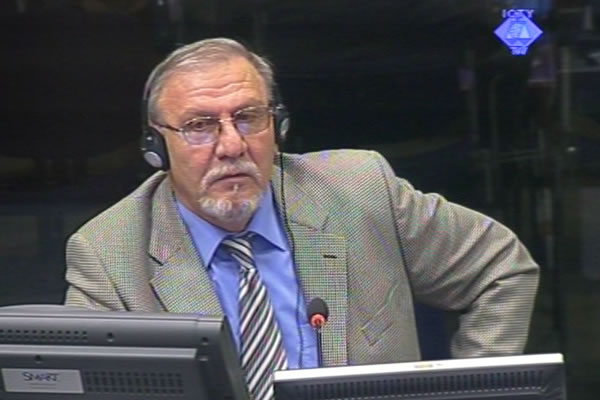Home
DJERIC: TIME IS NOT A GREAT HEALER
As the first Republika Srpska prime minister, Branko Djeric, explained, Radovan Karadzic’s position that the issue of war crimes should be dealt with later and that ‘time is a great healer’ was completely misguided. Not only did it ‘turn out that time is not a great healer’, but problems persisted even after Djeric left the office of the prime minister in December 1992. ‘Small wonder they later escalated’, Djeric remarked
 Branko Djeric, witness at the Radovan Karadzic trial
Branko Djeric, witness at the Radovan Karadzic trial Branko Djeric, the first Republika Srpska prime minister, is testifying at the trial of Radovan Karadzic. In October 1992, Djeric resigned from his post after a futile attempt to have the justice minister Momcilo Mandic and the interior minister Mico Stanisic dismissed. Djeric’s written statement was admitted into evidence in the examination-in chief. In his statement, Djeric said that Republika Srpska was a party-run state in which Karadzic was in charge of everything; he was assisted by his like-minded associates. Djeric claimed that Karadzic prevented the dismissal of Mandic and Stanisic.
As he answered Karadzic’s questions in the cross-examination, Djeric said that in late May 1992 the RS government started investigating war crimes and punishing the perpetrators. After receiving reports about the crimes from the media and diplomatic sources, Djeric’s government ordered justice minister Momcilo Mandic to present a report on the treatment of prisoners and civilians. Mandic failed to comply. The cabinet then launched the proceedings for Mandic’s and Stanisic’s dismissal, but Karadzic and Krajisnik did not give their political support for the action. In Djeric’s words, Karadzic and Krajisnik were ‘the alpha and omega’ in the RS.
Karadzic put it to Djeric that he ‘had not been opposed to the reshuffling of the government’: he was against any ‘dramatic dismissals’. As Karadzic noted, the deputies in the Assembly, and not Karadzic, decided that the two ministers would remain. Karadzic did admit that he didn’t really strive to have Mandic and Stanisic dismissed because ‘as a politician I didn’t dare fight battles I knew I would lose’. Karadzic’s position that crimes should be dealt with later and ‘time is a great healer’ was completely misguided. Not only did it ‘turn out that time is not a great healer’, but the problems remained after Djeric left the office of the prime minister in December 1992. As he added, ‘small wonder they later escalated’.
In the second part of the cross-examination, Karadzic focused on the way the Serb authorities treated other ethnic groups. Karadzic quoted from his speech at an Assembly session in late July 1992, when he said that ‘nobody touches’ the Muslims in Pale; Serbs politicians wanted to reassure them there was no reason for fear, he added. Karadzic claimed that the Muslims ‘stayed [in Pale] for as long as they wanted and left when they wanted’. At one point, as he claimed, the Muslims from Pale volunteered to leave and go to Sarajevo because they felt ‘uncomfortable’ when the coffins with dead Serb soldiers started arriving in Pale, Karadzic said. ‘I don’t know about that’, Djeric replied tersely to Karadzic’s claims.
Karadzic already presented a similar argument as he cross-examined Sulejman Crncalo, who testified that the Muslims from Pale left their homes in the spring and summer of 1992 because of the pressure exerted by the Serb authorities. As Crncalo recounted in court, Nikola Koljevic told the Muslim delegation at a meeting, ‘you can wish to remain in Pale all you want, but it’s all in vain because Serbs don’t want to live with you any more’.
Linked Reports
- Case : Karadzic
- 2012-04-23 BUTLER: CLEANING UP TERRAIN IN THE MIDDLE OF A BATTLE WOULD BE MADNESS
- 2012-04-23 KARADZIC WANTS DODIK AND STAKIC AS WITNESSES
- 2012-04-20 KARADZIC SEEKS INTERVIEW WITH STOLTENBERG
- 2012-04-25 KILLING THE PEOPLE OF SREBRENICA WAS DISCUSSED ‘IN A HURRY’
- 2012-04-26 DEMOGRAPHICS OF ETHNIC CLEANSING AND TERROR
- 2012-05-01 LATEST DATA ON VICTIMS OF SREBRENICA GENOCIDE
